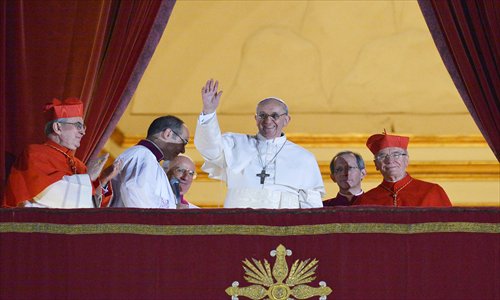Beijing-Vatican breakthrough not expected

Chinese mainland bishops and Hong Kong Cardinal John Tong Hon expressed their hopes Thursday that China-Vatican relations could improve after the election of Pope Francis.
But analysts said that although the Vatican is likely to continue to seek dialogue with China under Pope Francis, major breakthroughs in Beijing-Vatican relations are not expected.
Cardinal John Tong Hon of Hong Kong, the first Chinese cardinal in history to take part in a conclave, told the Global Times in an exclusive interview that he believed the new leadership of the Roman Catholic Church "will push hard for better relations with the Chinese government."
On the dialogue between China and the Vatican, the cardinal added that "a dialogue should be agreed to from both sides." Tong Hon has expressed on many occasions his commitment to act as a bridge between the Vatican and China to help ease complex relations between the two.
Chinese mainland bishops also say they hope Beijing and the Vatican can repair strained relations.
Fang Xingyao, chairman of the Chinese Catholic Patriotic Association, said a resumption of diplomatic ties was the key to improving China-Vatican relations, according to reports in the South China Morning Post.
"After you have established ties, you can negotiate anything, but before that, many problems tend to occur," he was quoted as saying.
Jorge Mario Bergoglio, 77, the archbishop of Buenos Aires, was elected Pope Francis on Wednesday by the cardinals after two days of secret ballots in a conclave held in Vatican City, becoming the first Jesuit and non-European pope in 1,300 years to lead the world's 1.2 billion Catholics.
China on Thursday congratulated Bergoglio's election as new pope, but urged the Vatican to be "practical and flexible" for an improvement in China-Vatican relations.
China urged the Vatican to sever its so-called diplomatic relationship with Taiwan and recognize the government of the People's Republic of China as the sole legal government representing China, Chinese foreign ministry spokeswoman Hua Chunying told reporters at a regular press briefing in Beijing.
She also said that the Vatican should not interfere in China's internal affairs under the name of religion. These are the two basic principles for China when it deals with relations with the Vatican, according to the spokeswoman.
China-Vatican ties were cut in 1951, two years after the founding of the People's Republic of China.
There has been speculation that because Pope Francis is a Jesuit, there may be conditions for increased engagement between Beijing and the Vatican given the historical relationship between China and the Society of Jesus.
The Jesuits are known for their missionary activities in China in the 16th and 17th century, which played an important role in promoting the exchange of knowledge, science, and culture between China and the West. Such activities are also believed to have had a major impact on Christian culture in Chinese society today.
Jean-Pierre Charbonnier, a priest of the Missions Etrangères de Paris Society (MEP) and the Director of the China Service of the Paris Foreign Missions Society, told Radio France Internationale (RFI) in an interview Thursday that the Society of Jesus has experience in dealing with China and this could be used by Pope Francis when engaging with Chinese Catholics.
Many members of the Society of Jesus have been in contact with China and Chinese and there is a traditional friendship between the two sides, Charbonnier noted.
But some analysts aren't optimistic about the prospect of China-Vatican ties under the new pope.
"Pope Francis is first a leader of the Vatican and Catholic Church. He was elected because he was believed to be suitable to lead the Vatican, not because he is a Jesuit," Wang Meixiu, a researcher with the Institute of World Religion Studies at the Chinese Academy of Social Sciences, told the Global Times. "When dealing with China, he is likely to continue the Vatican's current policy. I think his role as a Jesuit will not make much difference."
Beijing and the Vatican are embroiled in a dispute over the authority to appoint bishops. Some bishops in China were excommunicated by the Vatican, which insists that only the pope has the power to appoint bishops.
"That said, I think Pope Francis will also try to find opportunities to engage with China and Chinese Catholics because as the leader of the Vatican, he must feel obliged to do so," Wang said.
The retired pope Benedict XVI during his tenure also sought to approach China. He once issued an open letter saying he sought to restore diplomatic ties with China and allowed the Chinese Philharmonic Orchestra to perform an unprecedented concert in the Vatican.
"There are also some obstacles needing to be overcome first before an improvement in ties, such as mutual misunderstandings. The process won't come easy," Wang noted.